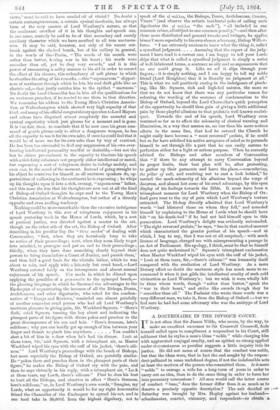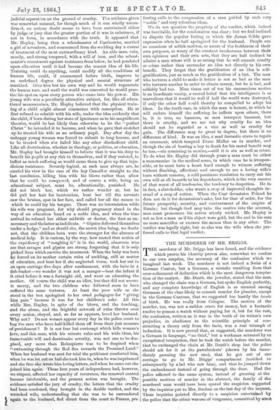A DOCTRINAIRE IN THE DIVORCE COURT.
IT is not often that Sir James Wilde, who seems, by the way, to make an excellent successor to Sir Cresswell Cresswell, feels himself called upon to compliment a respondent in his Court, still seldomer that he styles a man's ideas " noble " while charging him with aggravated conjugal cruelty, and an epithet so strong applied under circumstances so peculiar suggests a little inquiry into its justice. He did not mean of course that the conduct was noble, but that the ideas were, that in fact the end sought by the respon- dent palliated in some undefined degree, if not the indefensible acts at least the motives of the person who committed them. Is it more " noble " to outrage a wife for a long term of years in order to carry out an idea, than to do-the same thing in order to force her into pecuniary concessions ? All men would call the latter course of conduct " base," does the former differ from it so much as to deserve a precisely opposite description? The suit decided on Saturday was brought by Mrs. Hopley against her husband— schoolmaster, convict, visionary, and respondent—to obtain a judicial separat'on on the ground of cruelty. The evidence given was somewhat unusual, for though much of it was wholly uncon- firmed, no serious doubt seems to have been entertained either by judge or jury that the greater -portion of it was in substance, if not in form, in accordance with the truth. It appeared that Mr. Hopley, being then a schoolmaster of Eastbourne, married a girl of seventeen, and commenced from the wedding day a course of treatment of the most extraordinary kind. An able man, vain, moody, and strong tempered, tvith a will of iron, and the school- master's resentment against resistance from below, he had pondered upon education until it had become the master idea of his life. Training could do anything, could modify all the conditions of human life, could, if commenced before birth, improve to an undefined degree the physical and mental structure of mankind. Give him but his own way and he would regenerate the human race, and until the world was converted he would prac- tise his system upon every person who came into his power. His young wife was a peculiarly attractive subject, for, like all educa- tional monomaniacs, Mr. Hopley believed that the physical train- ing of a child might almost commence with conception. He at first refused to cohabit with his wife, under the idea evidently that the child, if born during her state of ignorance as to his magnificent theories, would be less likely than otherwise to be the " perfect Christ he intended it to become, and when he gave that crotchet up he treated his wife as an ordinary pupil. Day after day the unhappy young woman was forced to submit to long lessons, and to be treated when she failed like any other disobedient child. Like all doctrinaires, whether in theology, or politics, or education, Mr. Hopley had brought himself to believe that it was his duty to benefit his pupils at any risk to themselves, and if they resisted, to inflict as much suffering as would cause them to give up that inju- dicious resistance. Severely logical, as such men always are, he -carried his view in the case of the boy Cancellor straight to the last conclusion, killing him with his blows rather than allow that he could ba conquered, and of course a wife, being an educational subject, must be, educationally, punished. He did not birch her, which we rather wonder at, but he did pull her hair for inattention, beat her till the servants saw the bruises, spat in her face, and called her all the names to which he could lay his tongue. There was no intermission while his wife was pregnant, for why should pregnancy stand in the way of an education based on a noble idea, and when the time arrived he refused her either midwife or doctor, the first as un- necessary and thelatter as indelicate. " Gipsies delivered themselves under a hedge," and so should she, the secret idea being, we doubt not, that the children born were the stronger for the absence of medical help. It is curious, by the way, how rooted that notion of the expediency of " roughing it" is in the world, observers who .see that savages and gipsies are strong forgetting that it is only picked lives which survive the treatment. When the baby was born tie forced on its mother certain rules of suckling, still as matter of education, and beat her if she neglected them, took her out in an open carriage five days after confinement, with the babe in a fish-basket—we wonder it was not a manger—beat the infant if it cried before it was a fortnight old, and went on educating the mother. Of course the child was an idiot, but that did not secure it mercy, and the two children who followed seem to have suffered the same tortures. At least the poor wife as she stood in the box apologized to her cruel pedagogue for "giving him pain " because it was for her children's sake. All this while Mrs. Hopley, in spite of the blows, and the teaching, and the abuse, and the frightful network of rules thrown over every action, obeyed, and, so far as appears, loved her husband. Why not? Do not women appear every day in the police court to beg the men who have half-killed them off from their just measure of punishment? It is not fear but contempt which kills woman's love, and this man, with his minute rules and his wide ideas, his immoveable will and doctrinaire severity, was not one to be des- pised, any more than Robespierre was to be despised when 41 swimming through the Red Sea towards the Promised Land." When her husband was sent for trial the petitioner comforted him, when he was let out on bail she took him in, when he was imprisoned and she free she wrote him loving letters, and when he came out she joined him again. Those four years of independence had, however, we suspect, affected her capacity of reverence, the renewed control became intolerable, and the present action was brought. The evidence satisfied the jury of cruelty, the letters that the cruelty had been condoned, they brought in the double verdict, and the wretched wife, understanding that she was to be surrendered again to the husband, fled direct from the court to France, pre-
ferring exile to the compression of a man guided by such very " noble " and very relentless ideas.
We do not question the propriety of the verdict, which indeed was inevitable, for the condonation was clear ; but we feel inclined to dispute the popular feeling to which Sir James Wilde gave expression when he half apologized for the husband. People are so conscious of selfish motives, so aware of the feebleness of their own purposes, so weary of the constant incoherence between their own opinions and their own acts, that they are half inclined to admire a man whose will is so strong that he will commit cruelty or crime rather than surrender an idea not directly to his own benefit. They forget that the gratification of an idea is self- gratification, just as much as the gratification of a lust. The man who tortures a child to make it better is not so bad as the man who tortures another in order to obtain money, but he is bad, and selfishly bad too. Nine times out of ten his unconscious motive is an inordinate vanity, a rooted belief that his intelligence is so marvellous that it would be well if half the world were destroyed, if only the other half could thereby be compelled to adopt his ideas. In the tenth case, in which the man is honest, in which he will endure himself the suffering he inflicts upon others, there is, it is true, no baseness, as men interpret baseness, but there is cruelty, and we see not why cruelty for an idea should not be regarded as a vice as well as cruelty for gain. The difference may be great in degree, but there is no difference of kind. It was an idea, a mad fantastic crave to regain an ornament, which tempted Franz Miller on to murder, and though the sin of beating a boy to death for his moral benefit may be less,—sin consisting in motive,—still it is sin as well as crime. To do what Mr. Hopley did through years a man must be either a monomaniac in the medical sense, in which case he is irrespon- sible, or he must have a heart hard enough to witness suffering without flinching, affections cool enough to see a loving wife's tears without remorse, a cold persistent resolution to carry out his own will at all hazards to his dependents, which is the very essence of that worst of all tendencies, the tendency to despotism. He is, in fact, a alaveholder, who wants a crop of improved thoughts in- stead of a crop of cotton. When the Czar devastates Poland he does not do it for devastation's sake, but for that of order, for the future prosperity, security., and contentment of the empire of Russia ; but though God may take the motive into the account, man must pronounce his action utterly wicked. Mr. Hopley is not as low a man as if his object were gold, but the end in his case no more sanctifies or excuses the means than in any other. The verdict was legally right, but so also was the wife when she pre- ferred exile to that legal verdict.































 Previous page
Previous page